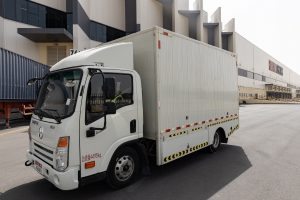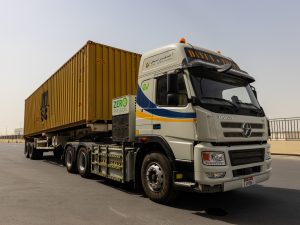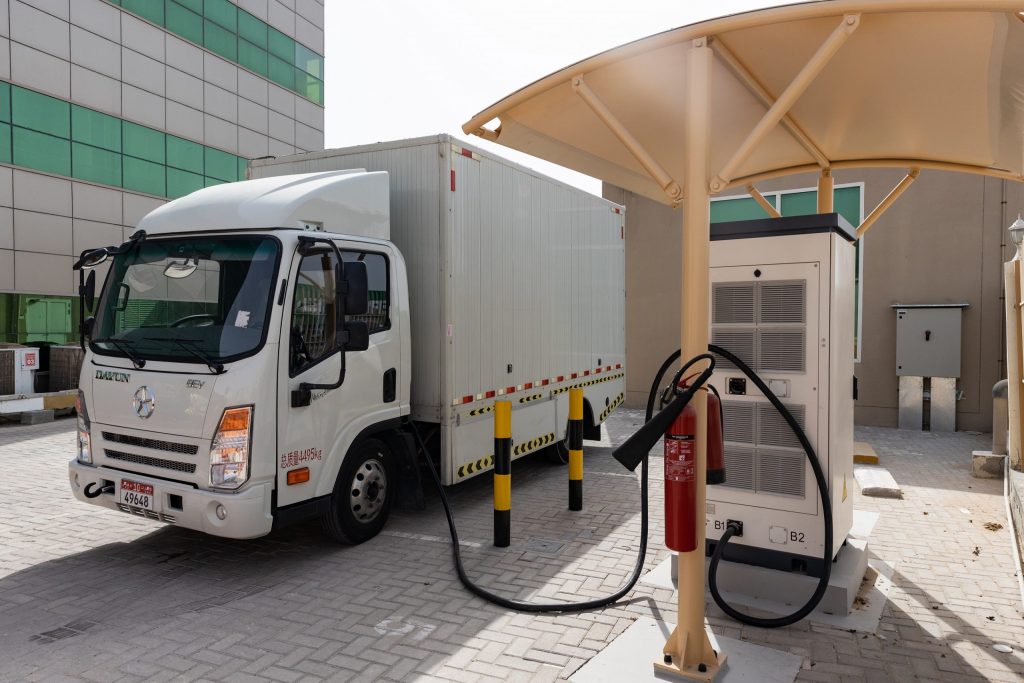Emirates Logistics’ G. V. Gomes, General Manager – Fleet Logistics and Johan Bergwerff, Managing Director sit with Jochebed Menon to discuss the company’s sustainability initiatives and the direction they’re headed toward
According to the International Energy Agency, the transport sector account for 21% of global carbon emissions. This has implored many logistics companies in the region like Emirates Logistics to explore renewable energy source to power their businesses.
Emirates Logistics, the logistics vertical of Sharaf Group, has gained a name in the market for being a reputed logistics firm offering total supply chain services such as 3PL logistics, land transport, freight forwarding, relocation, eCommmece and last mile delivery, breakbulk cargoes, and custom brokerage services.
 Since its inception Emirates Logistics has made strategic investments in infrastructural development, worldwide agent network and technological expertise, enabling its speedy acceleration as a renowned and successful brand both in UAE and Middle East Subcontinent & Africa catering to some of the top brands in retail, furniture and FMCG sector.
Since its inception Emirates Logistics has made strategic investments in infrastructural development, worldwide agent network and technological expertise, enabling its speedy acceleration as a renowned and successful brand both in UAE and Middle East Subcontinent & Africa catering to some of the top brands in retail, furniture and FMCG sector.
The firm has also strategically established itself in the Middle East, Southeast Asia and the Indian subcontinent, enabling to grow and expand into newer markets aligned with their client’s expansions plans. Today Emirates Logistics has its global footprints in India, Pakistan, Saudi Arabia, Morocco, Malaysia, Egypt and Kenya. And has multiple distribution centers in each country and transport and logistics support capabilities to cater to the growing volumes and capacities of their clients. So with 54 office network across continents and 1,700 growing workforce Emirates Logistics has built its brand as a logistics provider for their clients who can be steadfast, secure and importantly flexible to their clients changing needs).
As it began its global expansions, the company focused its resources on sustainability and the environment, which are now key priorities of its business strategy.
 Eco-friendly logistics
Eco-friendly logistics
Managing Director Johan Bergwerff reveals: “From solar panelling in our warehouse, to energy saving initiatives in the offices, and electric vehicles for transport. We believe logistics can be conducted in an eco-friendly and sustainable manner where all parties come out winners.”
He adds: “As a company, we are constantly researching and developing more sustainable, efficient, and cost-effective ways of providing logistics service to our customers. In line with the global 2030 sustainability development goals, we are setting our internal objectives and targets to achieve in the coming years. We started our electric vehicle truck testing and implementation project two years ago and we are now proud to provide this service to our customers in the UAE and looking forward to implementing this in other territories.”
Emirates Logistics’ main warehouse and office in Jebel Ali & DWC Free zone and its electric vehicles fleet are powered by solar energy generated from the rooftops of its warehouse.
In 2019, the company began the testing of electric trucks and after a two-year period, Emirates Logistics introduced two varieties into its fleet – a 6×4 heavy truck and a three-tonne box pickup.
 Electric trucks
Electric trucks
G. V. Gomes, General Manager – Fleet Logistics explains in detail: “All our electric vehicles are classified as BEV, which stands for Battery Electric Vehicles. They run completely on electricity provided by the battery of the vehicle that is charged daily by DC fast charges that we installed in our warehouse premises. We are currently running two types of vehicles in our operations the 6×4 heavy trucks that are used for container movement in the freezone which can carry a payload of 35 tonnes and with an energy capacity of 200kms on 100% charge, and the three-tonne box pickups that is being used for distribution of cargo locally inside UAE which can carry a payload of three tonnes and can run upto 300kms on 100% charge.”
The Dubai Electricity and Water Authority (DEWA) approved fast chargers enable the trucks to be charged 100% in 20 to 30 minutes.
Highlights and challenges
Gomes tells us that the team and well as their clients are ecstatic to have the EV trucks in operation after a two-year testing period. He adds: “Our demanding customers promote sustainability and environmental responsibility in their operations. We are pleased to provide solutions and initiates such as EV transport to help meet that requirements and goals.
 “When you are a market leader every milestone achieved is a highlight, right from identifying the exact vehicle manufacturing partner, to importing, setting-up the charging infrastructure, to testing and mobilising the fleet. We are proud how our achievements will contribute to moving the regional transport and logistics industry in a more sustainable and environmentally responsible direction.”
“When you are a market leader every milestone achieved is a highlight, right from identifying the exact vehicle manufacturing partner, to importing, setting-up the charging infrastructure, to testing and mobilising the fleet. We are proud how our achievements will contribute to moving the regional transport and logistics industry in a more sustainable and environmentally responsible direction.”
The journey so far hasn’t been easy, Gomes and the team have had to cross my hurdles.
“When you are implementing something new in a region, there will always be challenges. The main challenge was educating the market on the benefits of EV transport so that the industry can move in the right direction. We also continue to face challenges in charging infrastructure in the region that we hope will grow as the region becomes more aware and educated about electric vehicles and its benefits.”
Up next
Going ahead, Emirates Logistics aims to have an all-electric vehicle fleet. Bergwerff explains: “We hope to implement an EV fleet for transport across all our locations globally. We understand that every region will pose its own set challenges, but we are confident that we have the knowledge, experience, and capability to overcome these challenges.”
The firm is also looking to replicate its development in solar powered warehouse operations across all its businesses. He adds: “We will continue to research and developed more sustainable, efficient and cost-effective ways of doing logistics.”
Bergwerff believes the logistics sector is undergoing a major shift and will continue to do so for the next few years. “With the surge in diesel prices and sustainability goals in the region, we can expect to see massive changes in vehicles and transport infrastructure.
“For domestic transport, we expect there will be a shift to electric vehicle combined with sustainable energy sources such and solar and wind energy. In the long distance and cross border transport we can expect to see a shift to intermodular transport using a combination of rail and electric vehicles giving users a carbon neutral solution.”

